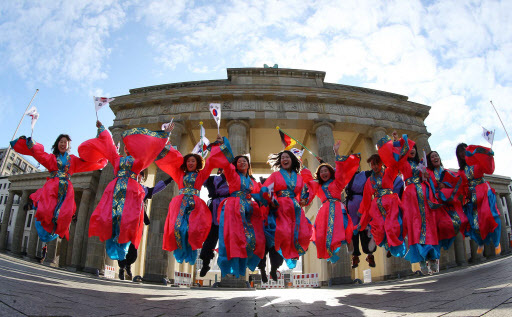BERLIN -- More than 250 passengers of the “Eurasia Express” staged a parade through the Brandenburg Gate on Friday in a display of South Korea’s commitment to a reunification with the North as their 20-day, 14,400-kilometer journey came to an end.
The one-hour, 2-kilometer march kicked off at the Victory Column, a monument built in 1864 to mark then Prussia’s defeat of Denmark, passing through the 17th of June Street, which was named after the day of a bloody workers’ uprising in 1953 in the eastern part of the city. It was also a national holiday for West Germany until unification.
Located at the center of the capital, the Brandenburg Gate is a symbol of German unity and one of the few landmarks that weathered World War II.
“There is no better place than Berlin for the Eurasia Express to wrap up its excursion in, given its aspiration to close the 70-year history of separation of the two Koreas and move forward into the grand future of unification,” Foreign Minister Yun Byung-se said in his congratulatory remarks ahead of the rally.
“While Germany celebrates the 25th anniversary of its unification, the Korean Peninsula is still suffering from the pain of separation. Throughout our journey, what we did not forget for a second was the day of unification on which the people of the two Koreas blend together, sharing freedom and peace.”
 |
Participants pose for a photograph after arriving in Berlin, Germany, as the last destination of the “Eurasia Express” that took them on a 20-day journey between the continents of Asia and Europe via special express trains. Yonhap |
The participants arrived here Thursday as the final destination, having traveled two different itineraries each from Vladivostok and Beijing after departing Seoul on July 14 and before merging in the eastern Russian city of Irkutsk.
Despite perceived travel fatigue, most passengers appeared lively and proud of their achievement. As they exited Berlin Central Train Station, some student participants let out a fleeting whoop and “We’re finally here,” while others congratulated each other for having completed the course, patting their colleagues on the back. A merry reunion also took place between a young female passenger and her German boyfriend.
Also joining them in Berlin were Korea Railroad Corp. president Choi Yeon-hye, North Gyeongsang Province Gov. Kim Kwan-yong, South Korean residents and students in the country and German officials and ordinary citizens.
Shin Un-shil, who flew to Berlin in 1970 as part of a government program to send nurses and lived there for 39 years, was particularly moved as she touched down in her second home on the special train.
“I vividly remember when the two Germanys reunited and the political turmoil in the lead-up to it,” the 66-year-old retired nurse said in an interview. “I envied them so much for having managed it without shedding a drop of blood. … I wish the two Koreas have more people-to-people exchanges so that they reduce differences (in) each other and North Koreans know more about the South.”
The project was a centerpiece of President Park Geun-hye’s “Eurasia Initiative,” designed to expedite greater business and sociocultural cooperation between the two continents by connecting roads and railways.
Yet it left the substantial challenge of inducing North Korea’s participation, which is pivotal to the realization of key routes such as the Trans-Korean Railway envisioned to link with the Trans-Siberian Railroad to reach Europe. With Pyongyang being aloof, the Eurasia Express took a detour and set out in Vladivostok.
Following the march, a welcome reception was hosted by Ambassador Lee Kyung-soo and a concert took place in front of Brandenburg Gate. The college students of South Korea and Germany had held a discussion on unification earlier in the day. The participants are scheduled to return to Seoul on Sunday.
By Shin Hyon-hee Korea Herald correspondent (
heeshin@heraldcorp.com)





![[Exclusive] Hyundai Mobis eyes closer ties with BYD](http://res.heraldm.com/phpwas/restmb_idxmake.php?idx=644&simg=/content/image/2024/11/25/20241125050044_0.jpg)

![[Herald Review] 'Gangnam B-Side' combines social realism with masterful suspense, performance](http://res.heraldm.com/phpwas/restmb_idxmake.php?idx=644&simg=/content/image/2024/11/25/20241125050072_0.jpg)
